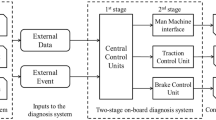Abstract
We provide a constant time schedulability test and priority assignment algorithm for an on-line multiprocessor server handling aperiodic tasks. The so called Dhall’s effect is avoided by dividing tasks in two priority classes based on their utilization: heavy and light. The improvement in this paper is due to assigning priority of light tasks based on slack—not on deadlines. We prove that if the load on the multiprocessor stays below \((3 - \sqrt{5} )/2 \approx 38.197\%\), the server can accept an incoming aperiodic task and guarantee that the deadlines of all accepted tasks will be met. This is better than the current state-of-the-art algorithm where the priorities of light tasks are based on deadlines (the corresponding bound is in that case 35.425%).
The bound \((3 - \sqrt{5} )/2\) can be improved if the number of processors m is known. There is a formula for the sharp bound \(U_{\mathit{threshold}}(m) = \frac{3m - 2 - \sqrt{5m^{2} - 8m + 4}}{2(m - 1)}\), which converges to \((3 - \sqrt{5} )/2\) from above as m→∞. For m≥3, the bound is higher (i.e., better) than the corresponding sharp bound for the state-of-the-art algorithm where the priorities of light tasks are based on deadlines.
A simulation study also indicates that when m>3 the best effort behavior of the priority assignment scheme suggested here is better than that of the traditional scheme where priorities are based on deadlines.
Similar content being viewed by others


References
Abdelzaher TF, Lu C (2001) Schedulability analysis and utilization bounds for highly scalable real-time services. In: 7th IEEE real-time technology and applications symposium, May/June 2001, Taipei, Taiwan, pp 15–25
Abdelzaher TF, Sharma V (2003) A synthetic utilization bound for aperiodic tasks with resource requirements, July 2003, Porto, Portugal
Abdelzaher TF, Andersson B, Johnsson J, Sharma V, Nguen M (2002) The aperiodic multiprocessor utilization bound for liquid tasks. In: 7th IEEE real-time technology and applications symposium, September 2002, San Jose, USA, pp 173–184
Andersson B (2000) Synthetic utilization in online aperiodic scheduling. In: IEEE real-time systems symposium, work-in-progress session, December 2000, Cancun, Mexico
Andersson B, Baruah S, Jonsson J (2001) Static-priority scheduling on multiprocessors. In: IEEE real-time systems symposium, Dec. 3–6, 2001, London, pp 193–202
Andersson B, Abdelzaher T, Jonsson J (2003a) Global priority-driven aperiodic scheduling on multiprocessors. In: International parallel and distributed processing symposium, April 2003, Nice, France
Andersson B, Abdelzaher T, Jonsson J (2003b) Partitioned aperiodic scheduling on multiprocessors. In: International parallel and distributed processing symposium, April 2003, Nice, France
Burns A, Wellings A (2001) Real-time systems and programming languages. Pearson Education, Upper Saddle, ISBN 0201729881
Dhall SK, Liu CL (1978) On a real-time scheduling problem. Oper Res 26(1):127–140
Lundberg L (2002) Analyzing fixed-priority global multiprocessor scheduling. In: 7th IEEE real-time technology and applications symposium, September 2002, San Jose, USA, pp 145–158
Lundberg L (2008) Slack-based global multiprocessor scheduling of aperiodic tasks in parallel embedded real-time system. In: The sixth ACS/IEEE international conference on computer systems and applications (AICCSA-08), March 2008
Lundberg L, Lennerstad H (2000) Guaranteeing response times for aperiodic tasks in global multiprocessor scheduling. Real-Time Syst 35(2):135–151
Author information
Authors and Affiliations
Corresponding author
Rights and permissions
About this article
Cite this article
Lundberg, L. Slack-based multiprocessor scheduling of aperiodic real-time tasks. Real-Time Syst 47, 618–638 (2011). https://doi.org/10.1007/s11241-011-9134-9
Published:
Issue Date:
DOI: https://doi.org/10.1007/s11241-011-9134-9


